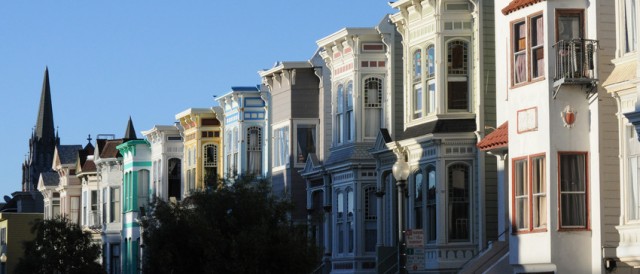Lee’s family can’t afford most legal units because they struggle to get by on $20,000 a year, just above the federal poverty level.
Illegal in-laws are often small apartments hidden from street view, and tucked in the garages and basements of single-family homes. Some lack basics like heating and kitchens.
City officials estimate there are more than 40,000 of these in-law units in the city. Many were built after World War II.
Supervisor David Chiu is sponsoring the ordinance to legalize them, as one fix to the city’s affordable housing crisis.
“For decades, we have had a shadow economy in San Francisco involving these technically illegal in-law units that were housing thousands of immigrants, seniors, families — many of our lowest-income and longest-term residents,” Chiu said.
City building inspectors don’t go after illegal units unless there are complaints. Every year the department takes about 100 units off the market for code violations.
Some landlords report their own illegal unit so the city will remove it from the market. Then they can evict the tenants, sell the house as a single-family home or raise the rent for new tenants.
Omar Calimbas with the Asian Law Caucus says this is one reason why landlords evict families like the Lees without consequences.
“The landlord can do that because there is no regulatory mechanism for tracking what a landlord does to that property, to that unit, once it’s removed from housing permanently,” Calimbas said.
Chiu and others say they don’t want to lose these affordable rentals.
In the past, Chiu says neighborhood groups opposed to density have blocked efforts to legalize, but, he says, things are different now.
“We’re in the midst of an affordability crisis,” Chiu said. “We’ve had skyrocketing eviction rates. We’ve had way too many families who are being pushed out of the city, and I think this is the right time for us to change our city’s policy toward in-laws.”
Chiu’s ordinance would simplify the process for landlords, but the details are still being worked out. The apartments would have to meet state health and safety codes, including having a working kitchen and bathroom.
Groups that represent landlords haven’t taken a formal position on the ordinance.
Henry Karnilowicz with the San Francisco Small Property Owners Association doesn’t think many landlords would take advantage of it.
“To legalize these units, it’s going to cost some money, and it might not be cheap,” Karnilowicz said. “It could be 50, 60, a hundred thousand, who knows how much that’ll be even.”
While the cost of bringing a unit up to state code might be prohibitively expensive for some landlords, building inspectors would have discretion to waive city requirements.
Ted Gullickson with the San Francisco Tenants Union is helping to write the measure.
He says two big things in the measure would help landlords legalize their units. One, it would change current zoning rules that don’t allow density. And two, it would not require street parking for a legal unit.
“Those requirements have always been fatal to any illegal units where the landlords actually wanted to legalize after being cited, because you just can’t get past those,” Gullickson said.
If this attempt to legalize in-law units passes, Kai Man Lee says it will take a lot of stress off tenants, and landlords.
But this debate isn’t helping the Lees right now. They’re going to have to move into another in-law that costs twice as much and is worse than their current apartment.
“The new place doesn’t have a sink, doesn’t even have a kitchen area, not even a refrigerator for him to wash any of his produce, or wash anything to prepare for dinner,” said Lee through a translator. “Most of the time he will have to prepare in the bathroom because that’s the only place that he can do it.”
Chiu’s ordinance is currently in a public review period and must be considered by the Planning Commission before it goes to the Board of Supervisors.

